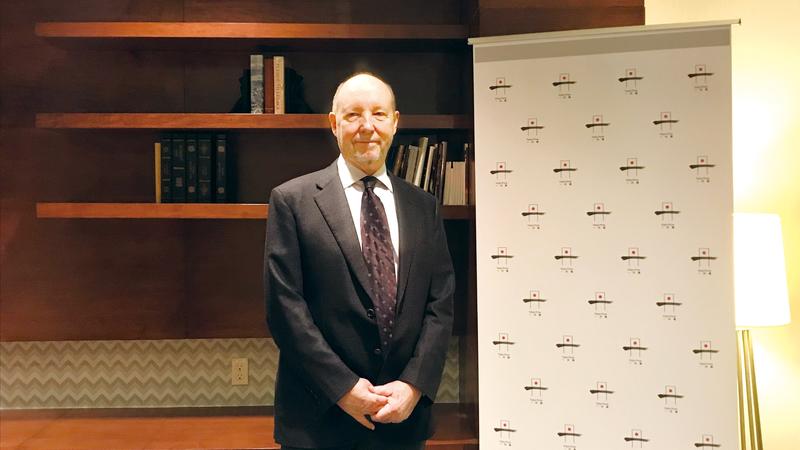Hedges - a maths genius who defied the odds


HONG KONG - This year's Yidan Prize for Education Research goes to US academic Larry Hedges — a veteran applied statistician and professor at Northwestern University in Illinois — honoring his contributions to the field with his application of meta-analysis.
His works included his 1995 study on differences in mental test scores between boys and girls. Combining mental test scores from six studies that used national probability samples, the study shows that males outnumber females substantially among high-scoring individuals in tests for reading comprehension, perceptual speed and associative memory.
Another notable achievement was Hedges' 1999 study on changes in the black-white gap in achievement test scores. Analyzing seven probability samples of national populations of adolescents from 1965 to 1996, the study found that in the top-scores distribution, black students performed poorly, indicating they had a severe disadvantage in competing for places in selective colleges and professional schools.
The term meta-analysis, which first appeared in 1978, refers to a methodology that synthesizes data across multiple, often the full population of relevant studies, to show clearer patterns for research subjects.
With more data, the results could be generalized into a larger population. The precision and accuracy of estimates can be improved as well.
"Meta-analysis is important because individual studies often give seemingly different answers to the same topic researched. But, meta-analysis rarely exhibits that kind of erratic behavior," explained Hedges.
He cited one of his projects in the late 1980s, in which various studies conducted in the US concluded that how much money a school spent on each student had no impact on the student's academic performance, thus having zero influence on the school's overall performance.
The results, which contradict what is commonly believed today, provoked Hedges to look at the matter from a different angle. A young professor at the time, Hedges and his students examined the studies the economists had used in their research and applied meta-analysis to the research materials.
After combining hundreds of individual studies, Hedges' team found that the studies showed the opposite to what the economists had concluded — that resources did play a role in students' performance.
"We published a paper. It caused quite a stir. It led to a number of states in America ensuring more equitable funding for education," Hedges recalled.
Against the odds
Currently, as chair of the department of statistics at Northwestern University, Hedges remembers being warned not to engage in education research. That was early in his career when he was a young assistant professor at the University of Chicago in the late 1980s.
He recalled his dean saying: "Larry, you're a smart kid. Why don't you work on something useful instead of this meta-analysis stuff?"
"At that time, there was a lot of pessimism about education research. Many people were saying it was impossible to learn anything about education by way of scientific means. We should give up. It just wasn't lucrative," said Hedges.
He didn't give up, though. "I was young and enthusiastic," he said with a grin. It wasn't the first time he was told not to do something.
Hedges hailed from a poor family. His father worked for minimum wages until retirement, while his mother used to wash dishes at California State University, Fresno. Nobody in the family thought Hedges would one day go to college although he had stood out among his peers, excelling in mathematics.
"We didn't know anybody who went to college. The college kids, as we used to call them, were different from us," Hedges said. During childhood, he was often told that college wasn't a place for a kid like him.
The turning point came when he was 15 and the brother of one of Hedges' classmates lent him a calculus book.
Hedges' talent in maths came into full display. He finished the book and completed the exercises. "I was kind of bored with what they tried to teach me in high school. I found myself so much into the advanced maths books," he said.
Hedges' high school principal recognized his talent in maths and talked to him who, by then, was in his senior year. The principal asked Hedges if he was interested in taking a maths course at the local college.
The help from the principal brought Hedges to the attention of many young professors at the college. They taught Hedges abstract algebra, mathematical analysis and topology, and prepared him to be eligible for a university scholarship.
"They were the first people in my life to talk to me as if it was obvious I would go to college and that I would go on to graduate school and probably become a professor. I began thinking of the possibility of being a college student," said Hedges.
A year later, Hedges was awarded the Regents Scholarship at the University of California, San Diego, where he studied maths and physics. He became the first member of his family to enter college.
"The reason I am passionate about education is precisely that it's a life-changing thing for me in terms of mobility, and I would like everybody else to have that chance," he said.
And his advice for young educators is: "Don't let others tell you what you can't do." His life offers the best illustration of such an advice.
Hedges plans to continue his research on education using the HK$30 million from the Yidan Prize. He's now working on ways to improve evaluation research so it can be generalized and replicated more easily by other researchers.
- 102-year-old veteran recalls war, hails China's rise
- China enhancing childcare services with eye on fertility rate
- Monkeys thriving at a research base in Hubei
- Youth exchange fosters cross-cultural friendships
- China expels Japanese vessel for illegally entering waters
- Explore Tianjin: Is everyone here so optimistic?





































